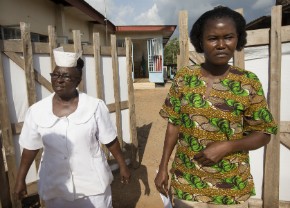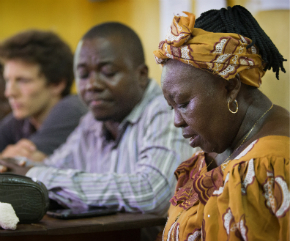United Methodists grapple with Ebola epidemic in Sierra Leone

A United Methodist pastor was forced to leave a new mission area in Sierra Leone because of the Ebola epidemic that has caused hundreds of deaths in West Africa.
Judith Banya is now in Bo, south of the Kailahun District, due to the increasing number of deaths in the area.
“The presence of a pastor, especially for a new church, is crucial,” Banya said. “My absence kind of dampens the enthusiasm of my congregation, and that saddens me. Some people don’t go to church when I am not there.”
Despite her relocation, she worked to educate those who previously believed the disease did not exist.
“I used an advantage—our people respect their pastors, their religious leaders, and chiefs,” she said. “So I went to the clinic and taught the people.”
Before then, she said, people in the Baiwala community where she works ran to the suburbs and asked to be treated by traditional herbalists or other untrained healers. They feared that if they came to the health facility, they would be told they had Ebola.
The epidemic, which started about five months ago in neighboring Guinea, crept into eastern Sierra Leone through Kailahun in early May. The United Methodist Church has launched an Ebola Emergency Response Plan focused on treatment, prevention, and public education—including by means of printed fliers, banners, radio, and text messages. The effort is concentrated in the Kailahun District but extends beyond it.
Sierra Leone bishop John K. Yambasu confirmed the closing of the UMC mission and Banya’s transfer and described the Ebola epidemic as “nearing disaster,” particularly in the Kailahun District.
“The sad thing is that the government is both ill-equipped and lacks the political will to respond to the situation with the seriousness and passion it deserves,” he wrote in an e-mail to the United Methodist Council of Bishops.
Yambasu also chairs a Christian-Muslim alliance, the Religious Leaders Task Force on Ebola, which is training religious leaders and health workers. Pastors and imams are expected to take their knowledge back to their respective congregations and preach about Ebola during every prayer session.
Religious leaders played a significant role in bringing the country’s civil strife to an end and also were pivotal in the reconciliation process, Yambasu said, and he believes they can do more now in the face of a common enemy called Ebola.
“We have realized that health workers are working under very difficult and challenging conditions,” he said. “The purpose of our intervention is to bring an end to that. If our health workers continue to die, we all are at risk of dying.”
United Methodist Mercy Hospital is situated close to the outbreak. The United Methodist Manjama Clinic in Bo was quarantined in July following the deaths of two Ebola-infected children.
 |
| Beatrice Gbanga (right) leads a prayer at the opening of a panel discussion on Ebola at the United Methodist Church’s Mercy Hospital in Bo, Sierra Leone. |
Beatrice Gbanga, a missionary with the United Methodist Board of Global Ministries and medical coordinator for the United Methodist Sierra Leone Annual (regional) Conference, said that family and friends of an infected person may refuse to seek medical help for them because they fear they will never see their loved ones again. In such situations, health-care workers try to establish trust with the family in order to care for the patient. Gbanga also encouraged them to take precautions for themselves.
About 50 miles from Mercy Hospital, the government hospital in Kenema is being used as the treatment center for Ebola cases.
Mbalu Fonnie had been the head nurse at the small rural hospital for more than 25 years. Standing in her crisp, white uniform one day in June, she presented herself as a solid barrier between the patients under her care and the world.
She spoke of the hospital’s first Ebola patient, a pregnant woman. “She lost her baby, but she is much, much improved.”
The hospital would soon be overflowing with Ebola patients. Doctors Without Borders had just supplied the hospital with a tent, and young workers were out using handsaws and hammers to build a structure over the tent, which had already been blown over by a rainstorm.
Soon after that June interview, Fonnie became an Ebola patient and died. Veronica Karoma, Fonnie’s colleague at the hospital, also contracted Ebola but lived.
“Our fight really is to get a lot of survivors,” Karoma said in June. “They will help us tell the story and sensitize the rest of the community.”
This article was edited August 18, 2014.




